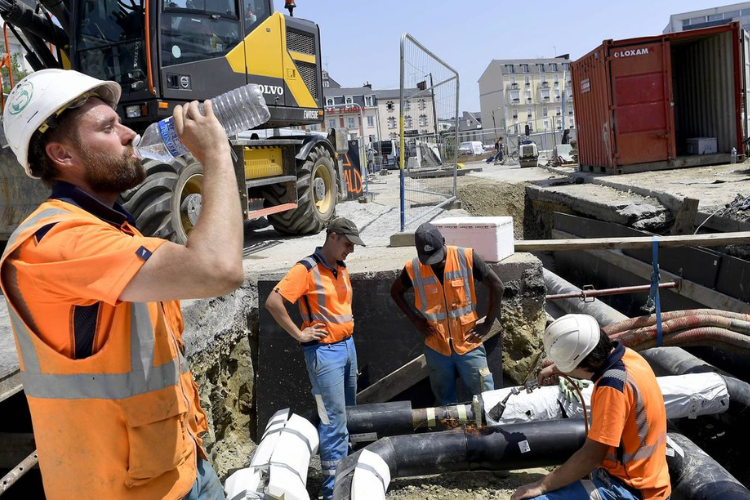The hedonistlabs laboratory
Strength, endurance, resilience: the qualities required of physical workers are numerous and crucial. Yet one fundamental aspect of their health and efficiency at work is often overlooked: hydration. While water is essential for avoiding fatigue and accidents, its value is frequently underestimated in the very environments where it is most needed.
What risks does a lack of hydration really pose for physical workers, and how can they avoid them to improve their safety and performance?
Physical workers play an essential role in many sectors, providing the physical effort needed to keep various industries running smoothly. However, the importance of staying hydrated during these physical activities is often underestimated.
Adequatehydration is not only crucial to maintaining workers' health and well-being, it can also have a significant impact on their safety and performance at work.
THE EFFECTS OF LACK OF HYDRATION ON PHYSICAL PERFORMANCE:
- Impact on muscular endurance and strength: Dehydration reduces the ability of muscles to produce strength and maintain prolonged endurance, which can compromise the overall performance of physical workers.
- Reduced ability to regulate body temperature: Insufficient hydration disrupts the body's ability to regulate its temperature, increasing the risk of overheating and heat stroke, especially in hot work environments.
- Decreased concentration and alertness: Dehydration can impair cognitive functions, leading to reduced concentration, alertness and reaction times, which can increase the risk of accidents and injuries in the workplace.
HEALTH RISKS ASSOCIATED WITH LACK OF HYDRATION :
- Mild, moderate and severe dehydration Mild dehydration manifests itself as a sensation of thirst and reduced physical performance. Moderate dehydration can lead to headaches, increased fatigue and reduced alertness. Severe dehydration can lead to serious complications such as dizziness, electrolyte imbalance and even circulatory collapse.
- Risk of injury and accidents Dehydration can increase the risk of musculoskeletal injury by weakening muscles and reducing concentration. In addition, impaired cognitive function increases the likelihood of accidents in the workplace.
- Long-term health effects: Chronic lack of hydration can contribute to the development of kidney disease by compromising renal function and promoting the formation of kidney stones. In addition, chronic dehydration can increase the risk of cardiovascular disease by disrupting blood pressure and circulation.
RISK FACTORS AND WORKING CONDITIONS :
- Environmental conditions Environmental conditions: High temperatures and humidity can increase the rate of perspiration, which accelerates the loss of body fluids. Workers exposed to hot, humid environments are therefore more likely to suffer from dehydration.
- Nature of work Work: Physically demanding, prolonged tasks carried out under difficult conditions increase the need for hydration. Workers performing intensive or continuous physical work are at greater risk of dehydration, as they rapidly lose fluids through perspiration.
- Exposure to other stress factors Working in hot environments, performing tasks at heights or under increased emotional stress can aggravate dehydration by accelerating the loss of body fluids and increasing hydration requirements.
STRATEGIES FOR PREVENTING AND OPTIMIZING HYDRATION :
- Worker education and awareness: Providing workers with information on the importance of hydration, signs of dehydration and best practices for staying hydrated can help them become aware of their own hydration status and act accordingly.
- Implementation of workplace hydration policies Develop policies that encourage workers to drink water regularly and to have access to readily available hydration sources in the workplace, such as water fountains or bottle-filling stations.
- Encourage regular consumption of water and suitable beverages Encourage workers to consume water throughout the day, as well as electrolyte drinks during periods of intense physical effort, to replace electrolytes lost through perspiration.
- Implementing breaks and rest periods to allow rehydration Planning regular breaks during which workers can rest, refresh and rehydrate is essential to prevent dehydration and maintain work performance.
CASE STUDIES AND PRACTICAL EXAMPLES :
- Examples of companies with effective hydration initiatives: Companies like Amazon and UPS have implemented proactive hydration policies, providing drinking water stations at regular intervals in their warehouses and encouraging employees to take breaks to rehydrate.
- Worker testimonials on their experience with hydration management at work: Workers in sectors such as construction and logistics often share positive experiences after implementing hydration policies in their workplace. They report a greater sense of well-being, reduced fatigue and improved ability to maintain performance throughout the day.
- Comparing policies and practices in different industries: Hydration practices vary from one industry to another. For example, construction workers may have access to drinking water tanks on worksites, while office workers may be encouraged to use reusable water bottles and take regular breaks to quench their thirst. Awareness and implementation of hydration policies also vary according to organizational culture and local regulations.
In summary, our laboratory set out to highlight the crucial importance of hydration for physical workers, as well as the serious risks associated with a lack of hydration on their health, safety and performance at work. We examined the adverse effects of dehydration on physical performance, health risks, risk factors and working conditions, as well as strategies for preventing and optimizing hydration.
It is essential that employers, occupational health and safety managers and workers themselves become aware of these risks and implement concrete actions to prevent them. This could include workplace hydration policies, awareness-raising and education programs, as well as initiatives to facilitate access to drinking water and encourage regular water consumption.





